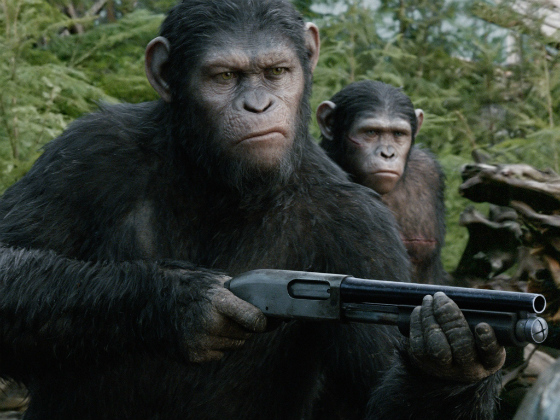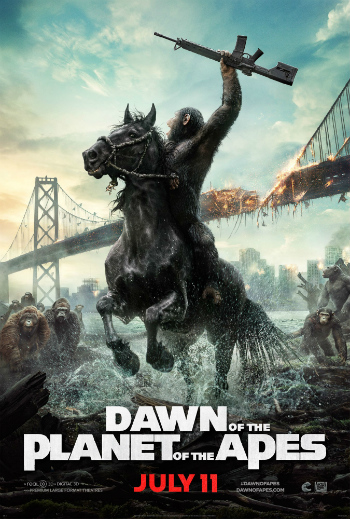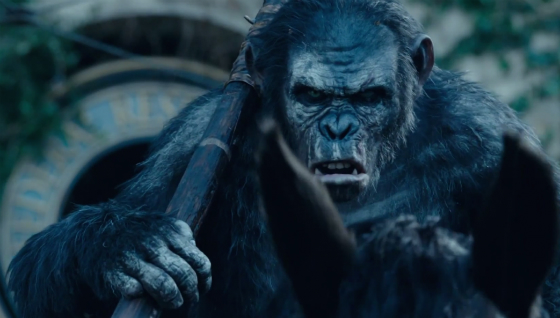TR Review: In Dawn of the Planet of the Apes, Perpetual War Is the New Apocalypse
 |
About a decade or so after a major catastrophe, a crisis-weary population has to decide whether to put its trust in an obviously smart leader who promises hope and advocates talking to enemies to look for diplomatic solutions…or his rival, a former POW who goes on and on about his torture and war wounds to prove he not only has credibility and experience, but also is completely justified in a policy of preemptive attack.
In the real world, we settle this with an election, and the worst that happens afterward is the occasional nasty word. But on the Planet of the Apes, the mutant chimpanzees aren’t quite so civilized as yet.
Just as the classic Planet of the Apes movies were primarily cautionary tales of the Cold War era, their contemporary descendants use the end of the (modern, western) world as metaphor for our post 9-11 conflicts – just how long will we continue to propagate cycles of war that are arguably of our own choosing (and if not ours, certainly the enemy’s), and can we break that cycle or must we remain subservient to it?
 |
| “Go, go, go, go, go, go…ALCATRAZ!” |
It’s a clever twist, if not necessarily a fun one. Dawn of the Planet of the Apes‘ own advertising is almost a form of war propaganda, as it depicts a triumphant looking ape on a rearing horse, wielding a gun and ready to kick some ass. But when you actually get to that scene, it’s the most depressing blockbuster battle since the cavalry versus Indians bit in The Lone Ranger – you root for neither side, only despairing that senseless death is happening.
(Which is the reaction sane people should have to actual war, but may not be the one they want from summer entertainment.)
The analogous scene in The Lone Ranger was wildly disliked because critics said it tonally clashed with the more comedic scenes (I’ve argued elsewhere that this comes from a mistaken understanding of the film, but won’t rehash that here), but nobody’s going to make the same accusation here, as the tone is consistent throughout: intense and despairing. It’s appropriate that a movie about the notion of perpetual war be depressing, and yet, aside from the question of whether or not multiplex audiences will feel satisfied with a movie that’s mostly concerned with the agonizing details of hostile diplomacy, that’s a narrative problem. For by the end of the movie, almost nobody has made any progress and we’re pretty much at that same place we started; even the big moral lesson – about not dehumanizing (or de-ape-anizing, depending on your side) the enemy – is dealt a whopper of a contradiction during one particular climactic scene.
Oh, sorry, have I not mentioned the plot yet? In a post-disease world with a fuzzy timeline (I thought the last Apes movie was set ten years in the future, but this one has President Obama in its opening montage; maybe he suddenly turned fascist and refused to step down?), a community of apes and a community of humans discover each other’s existence, and must decide if their traditional enmity makes any future peace impossible. That’s pretty much it. Jason Clarke, perhaps ironically cast on the heels of his torture-happy Zero Dark Thirty role, is the one understanding human who wants to call truce, while Andy Serkis’ chimp leader Caesar still has enough fond memories of James Franco to not go full King Kong on their asses (as these people have a skyscraper but no aircraft, they’d come out the losers in that scenario).
The apes and humans live across the bay from each other in San Francisco, and you’d think, as does Caesar, that they could stick to their own areas and be good. This is such a logical solution that screenwriters Mark Bomback and spousal team Rick Jaffa and Amanda Silver, all of whom worked on Rise of the Planet of the Apes, must throw in a few ironclad contrivances. Firstly, the people in the city are about to run out of power in two weeks, and the ONLY POSSIBLE way to get more is to activate the hydroelectric dam deep in ape territory. Secondly, the people have a transmitter to help find other humans left alive, but it simply cannot work with the generators they have now, and must wait for the dam power. Thirdly, the one essential guy who understands the dam science is a twitchy, paranoid ape-hater who also smokes and is a gun-nut. Dam, you! Dam you all to hell!
 |
More organic to the conflict creation is Koba (Christopher Gordon in the prior film, Toby Kebbell here), the aforementioned psycho John McCain chimp who, while deferential to Caesar on the surface, sees his commander-in-chief as a weak appeaser who simply doesn’t get that humans are an evil foe to be conquered. Though it’s hard to tell under the digital makeover, Kebbell’s voice inspires confidence that he will make a decent Dr. Doom in the upcoming Fantastic Four reboot (ironically, Gordon was Chris Evans’ stunt double in the previous iteration), so at least they got one casting choice right. Koba is the closest thing to a villain the film has, and his scarred visage makes him suitably frightening, though maybe he could commiserate with Simba’s uncle about the role facially injured animals are so often forced into onscreen.
Planet of the Apes movies traditionally end not only unhappily, but also with a message that the cycle of war will continue anew – key to the “anew” part, though, is that the subsequent film usually adds a different element to the conflict. This is essentially the same conflict as before, but continued, and unended, despite a crowd-pleasing climactic fight. It still feels like a prequel to something rather than the main event – as with The Phantom Menace, you get the sense that every significant plot point could be taken care of in five minutes to save us a movie. And of course, it IS a prequel: the filmmakers are saying this all leads to the Charlton Heston film, and if you wonder how that could be, use JJ Abrams logic and imagine Cornelius and Zira enter a tangent-universe past in Escape From the Planet of the Apes, resetting events anew. (Am I the only one who now wants to see the prequel about those face-peeling, nuke-worshipping mutants from Beneath?)
Planet of the Apes movies also tend to have a sense of humor – but other than the absurdity of chimps wearing skull facepaint to hunt deer, or a gas station in the jungle that still has working electricity connections and plays The Band, this is all pretty serious stuff, more so than you may be anticipating. I can’t say I didn’t enjoy the ambition and the seriousness with which director Matt Reeves takes the potentially absurd material, but I will forewarn that “entertaining” may not be the word you’re looking for here.
Asked after the screening if I liked it, I had to admit I didn’t know. I respect it for being as challenging and conflicted as it is , but it’s not here to make you happy.

